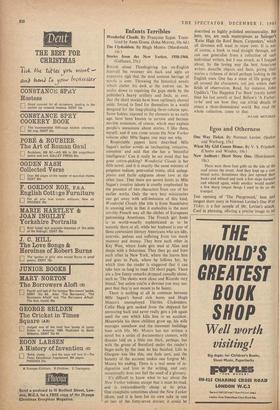Egos and Otherness
There were these four gulls on the side of the roof across the street. And they kept up a con- tinual noise. Sometimes they just opened their beaks and whined and took a few steps forward and whined again, while another would mutter a few sharp tongue things I used to do on the trumpet.
THE opening of 'The Playground,' best and longest short story in Norman Levine's One Way Ticket, is a fair sample of Mr. Levine's attack. Cool in phrasing, offering a precise image to set
off the picture that follows of St. Ives, it intro- duces the `I' who is never fat from the scene. The stories, in fact, are almost entirely autobiographi- cal—early years in Canada (of these The Cocks are Crowing' is the most finished), down-and-out in Sussex, more or less ditto in London, things a bit brighter in Cornwall. He is taking the first steps necessary to any writer, in recording im- pressions and experience, and doing it very well; in `The Playground,' for instance, his response to St. Ives is alive and meticulous, particularly When he describes the great stretch of Porthmin- ster beach with the studios behind it, the ceme- tery on the hill, and the surf-boards standing Upright in the sand `like the tombstones on the slopes'—a picture that takes in everything at a glance His characters are less satisfying; the Cornish lunatic fringe, living off and with each other on intermittent private incomes, painting a little, writing a little, drinking a lot, are recognisable as the denizens of that old rock pool of the Thir- ties. But they are used in this story as decoration, Part of the scene, and the story takes pattern and Shape without making many demands on them. What counts is the writer's own experience, and While this is true of nearly all the stories "(where he departs from it, as in 'A .Sabbath Walk,' he fails), it also severely limits their variety. Mr. Levine, having learnt the lessons of the early Hemingway, should try now to create and invent, to tell an objective story.
He might learn a lot from V. S. Pritchett's col- lection, Wizen My Girl Comes Home, a collection of stories from which the egotistical sublime is notably absent. Here people are born in a phrase, and by the end of a story have achieved a rich full life of their own. Effie, the artist, in pursuit of love and in turn pursued by a menacingly Paternal bronze statue; Manningtree, who dreams of the Inca Virgins of the Sun; and in the best story of all, Robert.Evans, the Welsh taxi- driver who is attracted to ,a lady visitor, totters on the brink of seduction, accepts her wheel- barrow instead, and goes back to preaching hell- fire at the Gospel tent—all these spring alive and voluble from Mr. Pritchett's shrewd and comic imagination.
The first volume of short stories in the New Authors series is astonishingly good. ,(Can the Publishers keep it up?) Carefully chosen for their variety, the stories range from the feminine awareness of Diana Athill-1 pick out 'Buried' as her most successful—to the brutality of 'The Losers,' a racecourse incident magnificently told by Maurice Gee; every story makes its impact. Miss Athill, poised between tenderness and a sense of absurdity, is a good writer, but her terri- tory • is familiar. The other three are New Zealanders and offer something different, although C. K. Stead in 'A Race Apart' chooses an upper-bracket English setting for a story Which, in its delicate manipulation of ironic tone, IS the most accomplished in the book. Maurice Gee's other story, .1-he Eleventh Holiday,' is eruder in outline, coarser in analysis, but a fas- cinating account of summer tourists dismayed by the invasion of their beach by bodgies.and widgies (Antipodean version, m. and f., of beat, shook- Up, hip. Implies motor-cycles and leather jackets). He is a powerful, strongly physical writer, unlike Mr. Stead, who is smooth and civilised, and a,bit of a romantic. Maurice Duggan I find the least original. In 'Chapter' he concentrates, like Mr. Levine, on description and personal sensibility, Making a stylish enough job of it; but his 'Blues for Miss Laverty,' an acid piece of fantasy, shows a more interesting development.
PATRICIA HODGART







































 Previous page
Previous page